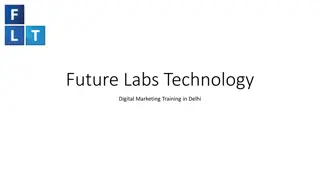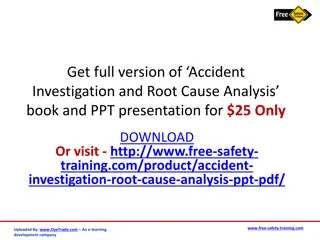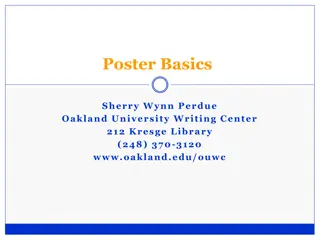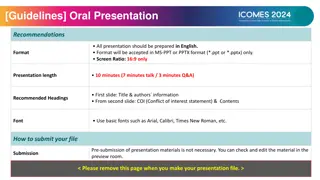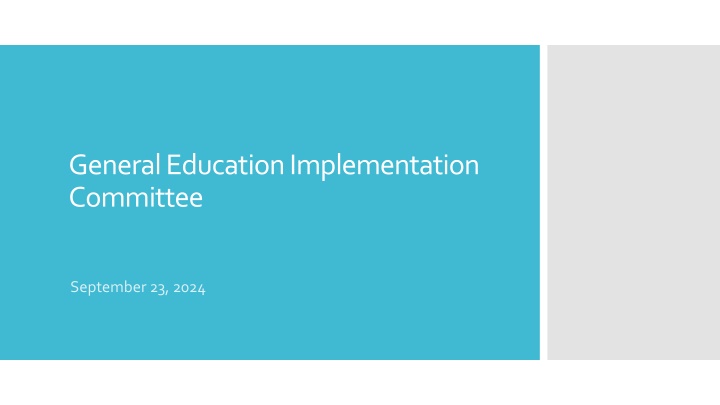
Tennessee Tech General Education Committee Recommendations
Explore the General Education Implementation Committee's vision and recommendations at Tennessee Tech University, aimed at enhancing the general education curriculum to prepare students for the challenges and opportunities of tomorrow. Recommendations include renaming categories and providing more choices to offer a comprehensive and inclusive educational experience.
Download Presentation

Please find below an Image/Link to download the presentation.
The content on the website is provided AS IS for your information and personal use only. It may not be sold, licensed, or shared on other websites without obtaining consent from the author. If you encounter any issues during the download, it is possible that the publisher has removed the file from their server.
You are allowed to download the files provided on this website for personal or commercial use, subject to the condition that they are used lawfully. All files are the property of their respective owners.
The content on the website is provided AS IS for your information and personal use only. It may not be sold, licensed, or shared on other websites without obtaining consent from the author.
E N D
Presentation Transcript
General Education Implementation Committee September 23, 2024
Holly Anthony (co-chair), Curriculum & Instruction Allan Mills (co-chair), College of Arts & Sciences Steven Anton, Mechanical Engineering Jeremy Blair; Art, Craft, & Design General Education Vision Committee Kent Dollar, History Helen Hunt, English Samantha Hutson, Human Ecology Jeanette Luna, Earth Sciences Linda Null, English & Chair of the General Education Committee Richard Pirkle, Biology LenlyWeathers, Civil & Environmental Engineering Heather Bertram, College of Education (student)
Gen Ed Vision Committee Goals & Recommendations The goals of this committee were to: To develop a vision/philosophy for general education at TN Tech, Identify potential pathways for operationalizing that vision, and See what might be possible as we dream big. Recommendations were compiled from data gathered from students, faculty, staff, and administration via 27 Town Hall Open Forums and a Qualtrics Survey (1200+ respondents).
Suggested Vision: Tech is Tomorrow. Through our general education curriculum, Tennessee Tech provides a pathway to tomorrow s opportunities. We envision a future where our students, empowered by a foundation of critical thinking, cultural awareness, and creativity are prepared to navigate and shape the challenges and innovations of tomorrow. Tennessee Tech s general education program is the cornerstone of a future where our graduates lead with confidence, adaptability, and a commitment to lifelong learning. Rationale: Points toward future but allows all colleges to participate.
Recommendation 1 Rename the current categories/buckets for General Education courses such that no name is the same as a department/unit on campus. Rationale: Categories whose names mirror those of departments(e.g., Mathematics, History, Communication) may convey a message that only those departments can offer courses within that category/bucket. More inclusive category/bucket names should make it clearer that any department can propose courses within a bucket (provided that the proposed course is aligned to the Student Learning Outcomes (SLOs) aligned with that category/bucket).
Recommendation 2 Provide more choices in the various General Education categories/buckets. Rationale: Some of the current categories/buckets(e.g., Communication; History; the Humanities/Fine Arts literature requirement, etc.) require students to choose from among only two or three courses. Providing more choices within these categories/buckets would allow students more flexibility in schedules and more ownership in how they fulfill the general education requirements. It would also allow departments more flexibility in scheduling and allocation of faculty/resources since more boutique /specialized courses could be offered (for example, History of American Innovation could be appealing to STEM majors and count for general education credit).
Recommendation 3 Investigate the possibility of a course meeting the requirements of multiple General Education categories/buckets (provided the alignment with the appropriate SLOs are documented/evidenced). Rationale: Faculty could collaborate to co-teach a course that could count within two general education categories/buckets.
Recommendation 4 Create a mechanism such that one-off courses can be offered for general education credit, like the mechanism used currently for Honors courses. Could a course be proposed and offered in only one semester but count for general education credit? Rationale: Faculty could offer more innovative and immediately relevant general education courses but not be committed to a permanent addition to their course load. Faculty from departments not traditionally associated with general education course offerings would have more opportunities to participate.
Recommendation 5 Investigate how faculty/departments/colleges can share/distribute SCH/load when faculty from different units collaborate to create/deliver general education course. Rationale: Faculty could collaborate to co-teach courses and equitably share/distribute the SCH/load.
Recommendation 6 Consider ways to incorporate Career Exploration, Financial Literacy, ideas of Global Citizenship, and Digital/Technological Literacy (Artificial Intelligence) into general education. Some options might be embedded strands/threads within/across general education categories/buckets and/or new categories/buckets that allow for the inclusion of these ideas. Micro-credentials or certificates/badges could be considered here. Rationale: Students have asked for these in general education and many institutions incorporate these concepts in their general education offerings.
Additional Recommendation 1 Move the General Education website to a more visible location (perhaps Academic Affairs) rather than housed within the College of Arts & Sciences (CAS). Rationale: General education courses are offered by various schools/colleges across campus and the general education requirements should stand out in the catalog and on the University website.
Additional Recommendation 2 Move the university faculty teaching award for general education to Academic Affairs where all other faculty excellence awards are housed. Rationale: General education courses are taught by faculty in various schools/colleges across campus.
Additional Recommendation 3 Make the General Education Committee (that reviews course proposals, transfer credits, etc.) a university standing committee that reports to Academic Affairs with a regular rotation of faculty representatives (like all other university standing committees). A new policy would be needed to address issues such as appeal processes if a proposed course is denied, terms of service for committee members, etc. Rationale: The General Education Committee is currently a subcommittee of the University Curriculum Committee. Elevation to a standing University Committee would emphasize the importance of general education to the University mission.
Implementation Committee General Education Committee Holly Anthony,* Curriculum & Instruction Tony Baker, English Linda Null,* English Allan Mills, Mathematics Deborah Barnard, Foreign Languages General Education Implementation Committee (n=31) Arthur Banton, History Stacey Browning, Nursing Kim Winkle; Art, Craft, & Design Janet Coonce, Chemistry Lori Maxwell, Sociology & Political Science Brittany Copley, Registrar Daniel Combs, Biology Chuck Craig, CoEdSSC Melinda Anderson, Human Ecology Dennis Fennewald, Agriculture Scott Christen, Communication Colin Hill, Music Julie Galloway, College of Business SSC Kelly McCallister, Volpe Library Steve Isbell; Econ, Finance & Marketing Collen Mestayer, Communication *co-chairs: Linda Null Holly Anthony Barbara Jared, Nursing Alma N ez; Econ, Finance, & Marketing Krystal Kennedy, Curriculum & Instruction Lindsey Roberts, Honors Jeannie Smith, Interdisciplinary Studies SSC Cara Sisk, Human Ecology Jerri Winningham, Enrollment Management Doug Talbert, Computer Science LenlyWeathers, Civil & Environmental Engineering Chris Wilson, General & Industrial Engineering
Gen Ed Implementation Committee Charge The goals of this committee are to: Review the Gen Ed Vision Committee s recommendations, and Involve campus stakeholders to develop a detailed implementation plan for those recommendations. Seven (7) subcommittees have been formed to accomplish this work.
Academic Area Subcommittees (4) Lead co-chair: Holly Anthony **Academic Areas SC members are encouraged to contribute to Procedural SCs.
Procedural Subcommittees (3) Lead co-chair: Linda Null **Procedural SC members are encouraged to contribute to Academic Areas SCs.
SC14: Academic Area Subcommittees SC1: Communication & Natural Sciences SC3: History & Social Sciences SC2: Mathematics & Humanities/ Fine Arts SC4: Digital Literacy Charge: Review SLOs in current Gen Ed Categories/Buckets and revise/update to ensure the Gen Ed Vision is captured Where do Digital Literacy and Financial Literacy belong (if anywhere)? New categories/buckets and/or embedded strands? Organize SLOs into appropriate categories/buckets proposing new category/bucket names (as needed) and/or new buckets/categories Review credit-hour requirements (total credits and credits/category)
SC5: Course Proposal Form Charge: Consider revisions in the current procedure for submitting a course to be included in the General Education curriculum Develop a new form for proposing a General Education course. Develop a procedure for submitting a TTU course to count as a General Education course but not to be included permanently as a General Education option (similar to a Special Topics course). (not to be confused with course substitutions for transfer students) Develop a procedure for appealing a rejection of a course submitted as a General Education course but not accepted (consult with Policies/Procedures Subcommittee)
SC6: General Education Teaching Award The General Education Teaching Award Committee is currently a subcommittee of the General Education Committee. It is migrating to a university-wide committee akin to other university awards within Academic Affairs. As such, policies and procedures must be reviewed and updated. Charge: Revision of current procedure for selecting nominees Revision of the documents sent to nominees
SC7: Policies and Procedures The General Education Committee is currently housed within Arts and Sciences. It will become a Standing University Committee. As such, the policies and procedures must be reviewed and updated. Charge: Revision and further development of General Education Committee Procedures You should especially but not exclusively consider how to rotate members of the committee to allow for some continuity over time. You should develop policy/procedures around appealing a course approval decision (consult with Course Proposal Subcommittee) Make recommendations for revision of Policy 259 General Education for subsequent committee
SLO spreadsheet This spreadsheet contains 27 universities General Education SLO s General Education SLO s
**We should pay attention to SACSCOC guidelines, our vision for general education, and what is best for our students. The following will come later. For now, these should not guide our work/recommendations. What to consider? Plans for course substitutions and transfer pathways Transcript designations of general education courses Department/faculty ownership of courses/load TBR/legislation exceptions/requests (if needed) Final Revision of Policy 259 General Education
Meeting to be held Week of November 18 for subcommittee reports and progress Share proposals/ideas with Faculty Senate (January 27, 2025) Work completed to hand-off to next committee (March 2025) Timeline Today: Work with Subcommittee Members to set a meeting schedule to accomplish work (post in Teams SC folder) stay connected with assigned lead co-chair (Linda or Holly) Review charge and ask questions to clarify tasks (set interim milestones)








